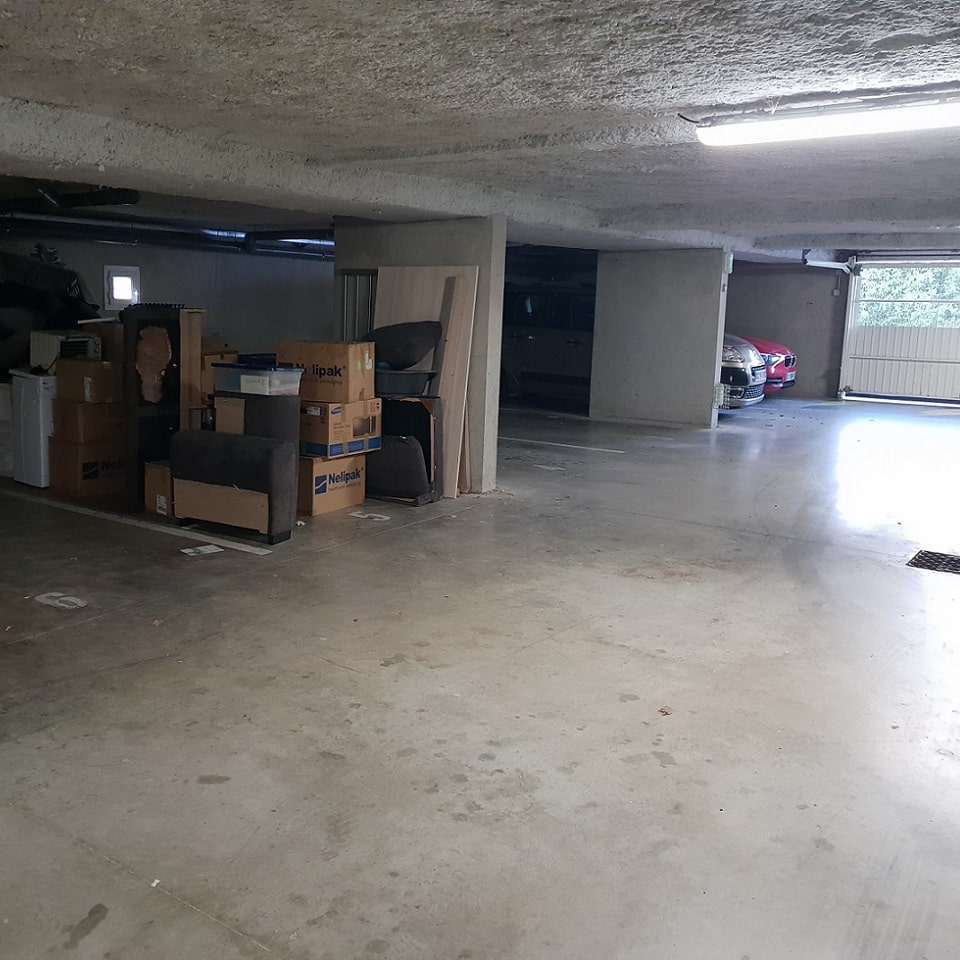Contrary to popular belief, you can’t store whatever you want in every garage ! With the explosion of storage spaces and furniture storage, everyone wants to rent out their garage to make money. Some configurations can get you into a lot of trouble, whether you are a landlord or a tenant.
The rules regarding storage change depending on the configuration of your garage.
📑 Table of contents

Underground garage : storage prohibited

Few people know this, but it is a decree on the risk of fire in underground car parks that justifies this ban.
An underground garage is intended only for parking vehicles. If you are in this situation, look in your condominium by-laws, you will find a mention: “use for parking only”. The condominium insurance company is then completely relieved of any responsibility since the rules confirm the ban. The law stipulates that each occupant, whether owner or tenant, must be aware of the condominium rules. It is therefore forbidden to store anything. In case of fire, the responsibility of the owner and the tenant can be engaged. If the fire is fanned by clothes, boxes, furniture, liquids, tires, etc… it is the beginning of big problems !
Experiments in progress
This is an experiment launched for 3 years. Most of the co-ownerships do not wish to authorize this experimentation. It must be said that the cases authorized by this decree are rare. It is necessary that your location has no direct access to the common parts of the building. The box itself must be equipped with a sprinkler system or located below the emergency access level. There are also other constraints that we summarize in the club’s forum.
Garage under dwellings : storage prohibited

A closed garage or box with houses or apartments above it is intended only for parking vehicles. It is therefore forbidden to store anything: neither furniture nor boxes. Each occupant, whether a tenant or landlord, must be aware of the condominium rules. Chances are that the condominium rules stipulate that the garages are for parking only. It is therefore forbidden to store anything. In case of fire, you could be held responsible.
Experiments in progress
This is an experiment launched for 3 years. Most of the co-ownerships do not wish to authorize this experimentation. It must be said that the cases authorized by this decree are rare. It is necessary that your location has no direct access to the common parts of the building. The box itself must be equipped with a sprinkler system or located below the emergency access level. There are also other constraints that we summarize in the club’s forum.
Covered parking with no accommodation above : furniture storage not recommended

In a common parking lot, you can store a few boxes. In most cases, it is the co-owners who determine the limits. If your neighbors are tolerant, you can store a bit of equipment (boxes, bicycles) behind your vehicle. There is no need to insist that you keep this space tidy. Conversely, furniture storage will be prohibited… the primary function of this parking lot must remain the parking of vehicles.

While storage is tolerated, it should not be abused. One club member was confronted with a parking space that was completely cluttered with stuff (see photo). In addition to the higher risk of theft in this configuration, a shared parking space that is improperly occupied will attract complaints and the attention of the union council and the condominium manager.
Once in the sights of the other occupants of the parking lot. The objective will be to have the parking space vacated by all means: theft, registered letter, eviction procedure, placing in the waste disposal center, pressure on the occupant or the owner, …
The best solution is to keep an eye on what’s going on in your parking spaces to avoid any problems. Keep in mind that storage can get out of hand, allowing a few boxes does not mean filling a space with boxes. Try to keep good manners.
Garage outside the two previous cases: storage and furniture storage authorized

In a garage that is not in an underground parking lot, nor in a common parking lot (double garage shared with another co-owner); you can store whatever you want! Finally, it is not recommended to store perishable foodstuffs or flammable materials and products. You don’t have to park a vehicle, you can use this garage as a furniture storage. Rent it using our free rental lease template or better with its special storage version.
How to protect yourself to avoid problems ?
Insurance waiver
There is a very high risk of non-compliance or misjudgment, which can cost you dearly. A member of our club rented a garage located underground and close to houses. A fire broke out in the parking lot. Fortunately, the fire did not start directly in his garage but in a neighbor’s garage. The report of the fire department’s expert underlined that the “stuff, boxes, cans, books and furniture” stored in his garage reinforced the fire and increased the harmfulness of the smoke.
With such a conclusion, this member saw several insurances discharging their responsibilities on this fault related to the decree on the parking lots for private use. The penal code defines the risk caused to others and even aggravated his case; since he was aware that his tenant was doing storage while it was forbidden in the condominium rules. His tenant was not worried because he had never been aware of the written prohibition in the rules of the common parking. This is why we recommend that landlords always send the condominium rules to their tenants…
Fortunately, no one was injured in the fire and the damage to the property can be repaired. Nevertheless, I can guarantee that this member’s bad experience serves as a lesson to all those who want to earn a little more money by renting a storage unit even if it is forbidden.
💡 Did you know : Be careful when you agree to rent a garage for storage, in some cases it can cost you a lot !
If you want to know more, our legal expert will explain this in detail on the forum and give you some tips on how to rent without worrying.
How to be sure you are allowed to store items
If in doubt, you can consult the co-ownership rules with your landlord; or directly with the syndic if your space is located in a co-ownership. If the mention “exclusively for the parking of vehicles” appears in the co-ownership rules, you do not have the right to store things.
There are several ways to get around this prohibition. If you are a landlord, the most common technique is to offload your responsibility onto your tenant. The idea is to have your tenant sign a rental agreement exclusively dedicated to parking. You can use and download our free template.
In case of fire, the insurance companies look for a responsible party. If the landlord is not aware of the storage activity of his tenant, he is theoretically not responsible. Be careful, you must be irreproachable in this kind of situation. Clearly state that storage is prohibited without implying otherwise.
You say : “It’s forbidden, but everyone does it”
This is the real debate on this subject, it is not because everyone stores things in a garage that you can do so without ignoring the law and the risks. If something goes wrong, everyone has to take responsibility for the consequences of their actions. Our lawyer often compares this subject with the traffic regulations. You have to respect the speed limits, yes, not everyone does. Caught on the radar, it is only a fine to pay and the withdrawal of point on your license. Hit a child on the road while intoxicated, your insurance will drop out, you pay for your whole life.
The case of storage is similar, if someone dies in a fire in a parking lot, the person responsible or the people who contributed directly or indirectly will pay for their whole life.
📰 Continue reading
Standard dimensions of car park or garage
We’ll look at the different sizes of parking spaces and garages for each type of vehicle: car, motorbike, scooter, camper van and caravan. We’ll give you two ideas to boost your yield. Read more…
Asbestos cement roofing: take extra care !
Lots of garages from the 60s and 70s are currently up for sale. The ageing owners prefer to sell rather than continue to use them. These old buildings have fibre cement roofs that may contain asbestos. Read more…
📧 Monthly newsletter
Join the 5000 subscribers in the real estate niche !



